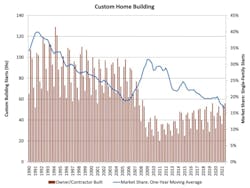Your business may be your greatest asset or investment, but are you thinking about it that way? Do you see it as an investment, or are you thinking about it as a paycheck? Or maybe you think about your business as a means to build cool stuff. Your motivations are your own, and I’m not here to judge. But I do believe, if given some thought, most business owners would agree the value of their business should, ideally, extend beyond their immediate motivations.
Think Like an Investor
In working with business owners and leadership teams to define and align on what makes up a business’ value, I’ve found that a good place to start is by asking simple questions, such as: Would you invest in your business?
Imagine you’re on the TV show Shark Tank and considering a $100,000 investment for 10% of your business. What are the determining factors to make that decision? What attributes make your business attractive and worthy of that investment?
The number of custom homes being built is on the rise. Is your company ready to capitalize?
Measures of Value
To find the answer, consider these perspective-adjusting questions to pose to yourself and your team.
Financial health: Is the business profitable? Do you consistently measure your profits and losses? Is the business hitting budget, sales, and production targets? Are internal decisions made with financial considerations in mind?
Product: Is your product of high quality? Is the product as you predicted it would be? Is the product different from your competitors? In today’s challenging market, is the product resilient to fluctuations?
Team: Are team members “A” players? Is there a strong team dynamic? Is there alignment on vision and mission? Are there synergistic relationships? Is there a gung-ho spirit?
Processes and systems: Do you have effective processes and systems in place? Are these processes being used or are individual personalities driving activities?
Leadership: Does leadership communicate effectively and instill confidence in the team? Is there a succession plan and a future leader (or leaders) in place?
Positioning: Is the business investing in the future or focused on the here and now? Are you ahead of the pack or just following other builders? Are you guiding clients and their projects or just responding to client needs?
Alliances: Are you isolated on an island or do you have strategic alliances? Do subcontractors and suppliers seek you out or are you seeking them out?
Plan for a Future
These are not the only criteria, but they are a solid starting point for beginning to understand the health of your business.
When I ask custom builders whether they have an exit strategy, most do not. But most would like to exit their business at some point and, ideally, that exit isn’t just shutting the door.
While you may not be ready to exit yet, this is a great way to better understand what you have. And, since the exit process can take many years, the more time you give yourself, the better. It’s been said that if you don’t know the answer, at least begin with the question. So, would you invest in your business?
Mark Richardson, CR, is an author, columnist, and business growth strategist.

